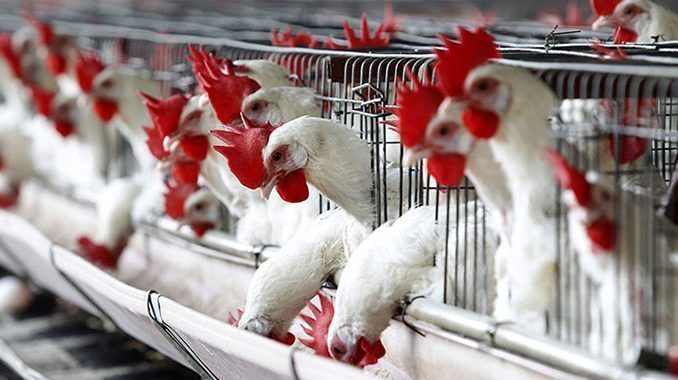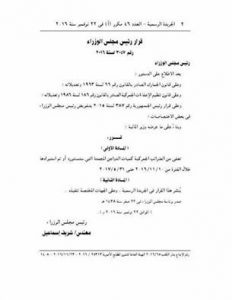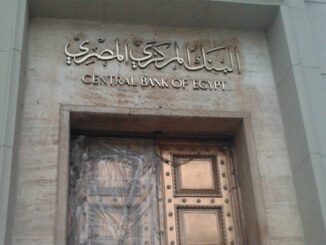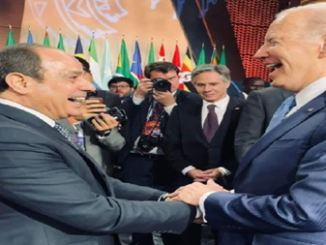
The Egyptian poultry producers were shocked by the decision of Egypt’s Prime Minster to exempt the poultry imports from customs duties.
The decision raised great dissent and anger among the local producers, who said that it would lead to disastrous results on the national industry as it did in 2006 during the ‘Swine Flu’ crisis.
Al-Waqa’i al-Masriya (In English, it is: ‘Egyptian Affairs’. Al-Waqa’i al-Masriya used to be the ‘Official Gazette’ of Egypt, and is now published as an appendex of the ‘Official Journal’) has published today the prime minister’s decree to exempt the poultry imports from customs duties, around 30% for 6 months starting from November 10 until May 31, 2017.
In response, Dr. Nabil Darwish, head of the General Union of Poultry Producers (GUPP), said that the decision is a “shame on the government” to work in favor of some few importers at the expense of the national industry.
He also stressed that the decision destroys the industry in all its stages and will also lead to the withdrawal of small and medium farms from the market as it will completely stop working. He also referred the government’s delay in announcing the decision immediately after it was issued in an attempt to put the poultry sector in a de facto situation through adopting a ‘shock policy’.
A week ago, the council of ministers was reportedly studying exempting the poultry imports from customs duties. At that time, the ministry of supply pledged to the GUPP that the decision was only ‘a study’ and it would be rejected.
In this context, Sayed Hassan, an MP, head of the parliament’s Agriculture and Irrigation Committee, GUPP depuy head, said that the companies will halt a monthly supply of 12 thousand tons of poultry, subsidized by the GUPP. This deal has been contracted this month and was scheduled to come into effect starting from December.
He also stressed that no quantity will be supplied before suspending the decision of cancelling the customs duties on the poultry imports. He explained that it was agreed to provide quantities at prices 30 % below the market prices to be borne by the GUPP, which cannot be accepted after the decision.
He also said that he will submit a request for briefing from the prime minster and the minister of agriculture regarding the decision, saying that the prime minister told him during a meeting last Tuesday that the decision was ‘just a study’ and that it would not be approved, which indicates that there are other parties who have private interests and do not care for the domestic industry.
Mahmoud al-Anani, the board chairman of al-Dakahlia Co. for Poultry, said the government destroys the domestic economy and industry for the benefit of a number of traders and importers.
al-Anani said that the government has made this decision to save dollars -in light of the dollar crisis- arguing that the import bill of the production requirements became a burden on the central bank’s dollar outcome, but they (the government) do not know the disadvantages of such a decision.
He continued, “the poultry prices are low globally, due to lower production costs in the most producing countries, particularly the United States and Brazil.”
He also stated that the decision has been raised recently, but all the poultry sector actors ruled out the possibility of putting it into effect, especially that the domestic production covers 90% of the consumption. Al-Anani added that there is no justification to issue such decisions in the light of a decline in poultry prices in the market.
The prices of poultry in farms ranges between 15-17 Egyptian pounds per kilo and the consumer price ranges between 18-20 Egyptian pounds per kilo.
In addition, Dr. Abdel Aziz al-Sayed, head of the Poultry Division at the Cairo Chamber of Commerce, called for quickly suspending the decision as it will have negative repercussions on all actors in the poultry sector especially the small producers.
He also said that Egypt’s poultry imports are estimated at around 80 thousand tons annually, worth nearly 2 billion and 150 thousand Egyptian pounds. He added that the state gets 30% as customs duties, equivalent to 790 million pounds, which means that the government’s decision (to exempt the poultry imports from customs duties for six months) costs the public treasury 400 million pounds (in customs duties wasted due to the decision).




